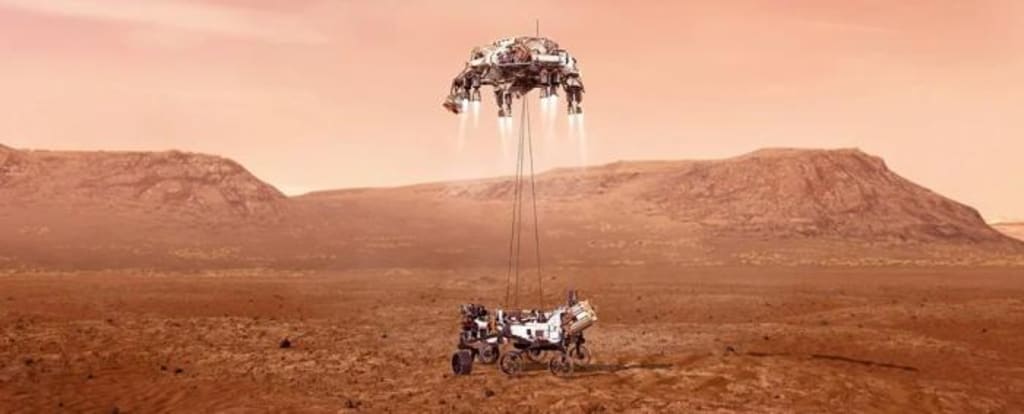Why haven't humans gone to Mars yet?
You can't go up there and come back?

NASA's Trail rover successfully landed in Jezero crater on the surface of Mars at 4:55 a.m. BST on Feb. 19, 2021. The Trail rover has been in space for more than six months since liftoff on July 30, 2020, and although it was launched slightly later than our SkyQuest 1 rover by a few days, it was the first to complete its mission to land on Mars, the most complex Mars rover to date and the fifth Mars rover sent to Mars by NASA.
As one of the most advanced Mars rovers are currently available, the Trail rover will search the Martian surface for environments that may support microbial survival, looking for signs of possible Martian microbes in those environments. The rover will also collect samples on the surface of Mars and store them in preparation for bringing them back to Earth in the future. In addition, the rover will use carbon dioxide from the Martian atmosphere to prepare oxygen for future manned landings on Mars.
Why haven't humans gone to Mars yet?
In addition to searching for potential microorganisms on Mars, there is also an important goal for human exploration, which is to study the habitability of Mars, and many people believe that Mars may become our future "second home" in the solar system. If so, why we humans have not yet landed on Mars?
Looking back at the history of human spaceflight, the exploration of the Moon and the exploration of Mars in terms of time are not much different, the first successful flyby of the Moon probe is the Soviet Union on January 2, 1959, launched the Moon 1 probe, the first successful flyby of Mars is the United States on November 28, 1964, launched the Mariner IV probe, from the first successful flyby of the Moon to the first successful flyby of Mars, only took more than 5 years. From 1959, when the first probe flew over the moon, to 1969 when man first set foot on the surface of the moon, it took just over 10 years, and from July 14, 1965, when the first probe flew over Mars, nearly half a century has passed, and man has still not set foot on Mars. Why can mankind set foot on the moon, but not on Mars?
In the final analysis, it is because the Moon is relatively close, while Mars is too far away. It only took a few days for a lunar landing craft from Earth to reach the moon, and nearly half a year for a vehicle from Earth to fly. The length of time is not a big problem for an unmanned spacecraft, but for a manned spacecraft, it becomes very important. Because manned spacecraft needs to carry complex life support systems, but also need to carry a large number of supplies to maintain the survival of astronauts, such as oxygen, water, food, etc. The existing spacecraft is not large, carries limited supplies, and can not meet the astronauts for up to six months of the space flight mission.
Most importantly, even if we solve the astronauts from Earth needed supplies, such as the ability to launch cargo spacecraft to resupply manned spacecraft at any time, it is difficult to send astronauts to Mars in a short period, because we also need to consider how to bring astronauts back to Earth, but also need to consider the problem of astronauts in Mars to survive.
Because the moon spacecraft can take off from the moon and start returning to Earth in just a few hours, returning to Earth from Mars is not possible. Mars spacecraft, rovers from Earth need to wait for a special launch window, about once every 26 months for such a launch window, and astronauts who land on Mars need to live on the surface of Mars for a long time, waiting for a specific window to take off from Mars and return to Earth.
Humans can return to Earth from the Moon, but not from Mars?
As a landmark Apollo manned lunar program, six groups of 12 astronauts have stepped on the surface of the moon and returned to Earth successfully. How did the astronauts take off from the Moon and return to Earth when there was no large launch site or launch vehicle on the Moon? Is the method of astronauts returning to Earth from the Moon applicable to the future landing on Mars?
The principle of astronauts returning to Earth from the moon is very simple, the moon landing craft weighing 45 tons from Earth does require a huge launch vehicle like the Saturn V, but the return to Earth from the moon is different. Apollo lunar spacecraft by about 6 tons of orbital module, about 25 tons of service module, and about 14.7 tons of the lunar module (lunar module including the descent stage, and the upper upgrade) 3 parts, when the lunar spacecraft reached the moon, it will release the lunar module to send astronauts to the lunar surface, while the orbital module, service module is left in lunar orbit, that is, landing on the surface of the moon only about 15 tons of the lunar module. The astronauts finally take off from the moon in the upper stage of the lunar module, while the descent stage, lunar rover, and other equipment are left on the lunar surface, the upper stage from the moon has a much smaller mass, the engine slightly increased thrust to lift off, and finally dock with the orbital module, service module and then return to Earth.
Although astronauts can return to Earth from the moon, but can not return to Earth from Mars, this is because the difficulty of returning to Earth from Mars is beyond imagination, and now humans landing on Mars may not be able to return. On the one hand, the flight time is too long and requires the consumption of a lot of supplies, on the other hand, the difficulty of taking off from the surface of Mars is also very large. It is difficult to take off from the surface of Mars because of the large gravitational force and escape velocity, plus Mars has a thin atmosphere, which will bring a certain air resistance to the take-off of the spacecraft. Of course, with the progress of science and technology, I believe scientists still have a way to solve various technical problems from Mars back to Earth, NASA plans to bring back Mars samples from Mars shortly and even plans to send astronauts to Mars in the mid-2030s. Our country also has a plan to take samples from Mars, perhaps shortly, we will also send astronauts to Mars。
About the Creator
Salachi Mavish
Optimize mental quality and achieve a happy life






Comments
There are no comments for this story
Be the first to respond and start the conversation.